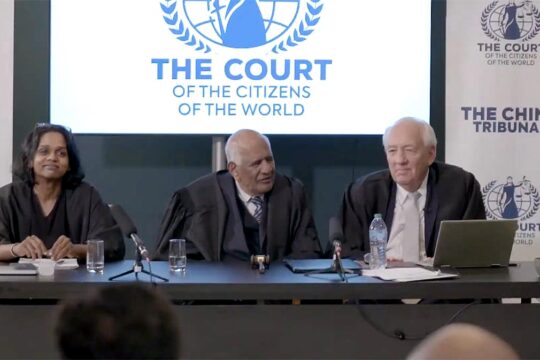The founder of one of China's few websites dedicated to reporting human rights abuses has been formally arrested for "leaking state secrets", Amnesty International said Thursday -- the latest blow in a broad crackdown on activists.
Huang Qi ran the website "64 Tianwang", named in part after the bloody June 4, 1989 crackdown on Tiananmen Square protestors, for nearly two decades.
Its headlines -- "Village Officials Stab Campaigner", "Gangsters Detain Protestor" -- are rarely seen in ordinary Chinese media, and the content is blocked on the mainland.
The site was awarded the Reporters Without Borders (RSF)-TV5 Monde Press Freedom Prize in early November. Twelve years ago, he received RSF's "Cyber-Dissident Prize."
Just weeks after receiving the most recent prize, Huang was detained by police in his hometown of Chengdu, the capital of the southwestern province of Sichuan, according to Amnesty -- his third detention this year.
Last Friday, his family received official notice that he had been formally arrested for leaking state secrets to overseas entities, the campaign group said.
It remained unclear whether he had access to a lawyer, Amnesty China researcher Patrick Poon told AFP, stating that Huang was "at risk of torture and other mistreatment".
"He may have been targeted because of the international attention he and his website received" from the RSF prize, Poon said.
Huang's arrest might also be intended as a warning to websites chronicling grassroots activism in advance of a controversial new law set to impose restrictions on foreign NGOs operating in China, which will come into force in January.
The law gives police wide-ranging powers over overseas charities and bans them from recruiting members or raising funds in the country.
"I'm quite worried that the government is trying to send a signal to organisations that they believe to have foreign links," said Poon, noting that authorities had detained Liu Feiyue, founder of the Civil Rights and Livelihood Watch website, around the same time as Huang.
President Xi Jinping has overseen a wide-ranging clampdown on civil society since assuming power in 2012.
But Huang's struggles to continue his work date even further back.
In 2000 he was jailed for five years, the first ever Chinese "cyber-dissident" to be imprisoned for online activism.
He was imprisoned again for a further three years in 2009 for reporting on low-quality school buildings that collapsed in a massive earthquake the previous year in Sichuan which claimed 87,000 lives.
He had been physically abused while in jail, Huang told AFP during an interview last year, but stated that he nevertheless felt that authorities now appreciated his coverage, as the exposure of injustices committed by local officials dovetailed with an anti-corruption campaign also launched under Xi.
"The top levels of government no longer think of me as a threat," he said at the time. "They even see me as useful, because I expose a lot of cases which they don't know about."



